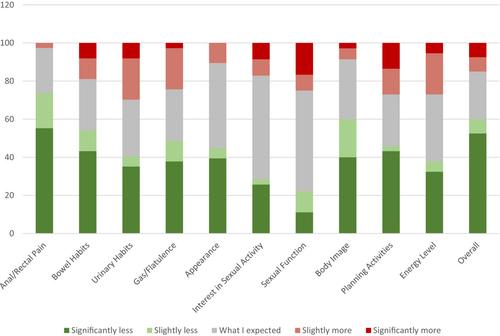The patient's perspective on radiation for rectal cancer: Initial expectations versus actual experience
Abstract
Background
The aim of this study was to compare patient perceptions of radiotherapy (RT) before and after treatment to better inform future patients and providers.
Methods
Seventy-eight consecutive patients with rectal adenocarcinoma treated with neo- or adjuvant chemoradiation, surgical resection, and adjuvant chemotherapy from 2009 to 2018 and who were without recurrence were included. Patients were surveyed ≥6 months after ileostomy reversal or ≥3 months after adjuvant chemotherapy. The survey assessed patients' baseline knowledge and fears of RT, how their short- and long-term side effects compared with initial expectations, and how their experiences compared for each modality (RT, surgery, and chemotherapy).
Results
Forty patient-responses were received. Before treatment, 70% of patients indicated little to no knowledge of RT, though 43% reported hearing frightening stories about RT. The most commonly top-ranked fears included organ damage (26%), skin burns (14%), and inability to carry out normal daily activities (10%). Eighty percent reported short-term effects of RT to be less than or as expected, with urinary changes (93%), abdominal discomfort (90%), and anxiety (88%) most commonly rated as less than or as expected. 85% reported long-term effects to be less than or as expected, with pain (95%), changes to the appearance of the treated area (85%), and dissatisfaction with body image (80%) most commonly rated as less than or as expected. Surgery was most commonly rated as the most difficult treatment (50%) and most responsible for long-term effects (55%). RT was least commonly rated as the most difficult treatment (13%), and chemotherapy was least commonly rated as most responsible for long-term effects (13%).
Conclusions
The majority of patients indicated short- and long-term side effects of RT for rectal cancer to be better than initial expectations. In the context of trimodality therapy, patients reported RT to be the least difficult of the treatments.


 求助内容:
求助内容: 应助结果提醒方式:
应助结果提醒方式:


